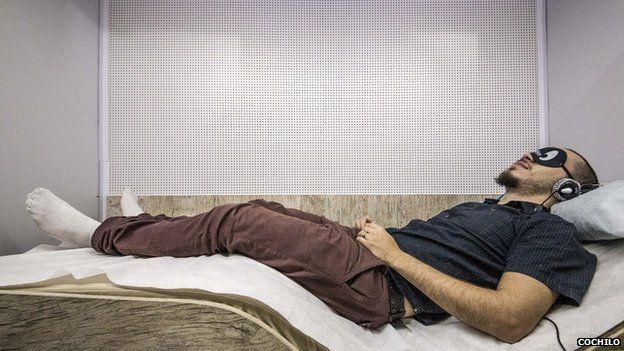The start-up firm which wants to put Brazil to sleep
- Published

Brazilian entrepreneur Marcelo von Ancken remembers the dilemma which inspired his new business - he had nowhere to take his afternoon nap.
The 51-year-old has a daily ritual at his office in downtown Sao Paulo - after eating lunch he likes to lean back and take a 30-minute siesta.
Mr von Ancken says he finds that having the little sleep gives him a renewed energy for the remainder of the day.
Yet one lunchtime back in 2010 he was across town waiting for an afternoon meeting.
Unable to get back to his office, he instead tried, and failed, to take a power nap in his car. An attempt to sleep on a shopping centre bench was equally unsuccessful.
The frustration was the spark of inspiration for a new company - a drop-in centre where members of the public can go for a quick sleep.
After two years of planning, Mr von Ancken opened the first branch of Cochilo (the Portuguese word for "nap") in downtown Sao Paulo in 2012.
Open from 7am to 9pm, the centre has 20 soundproofed cabins, just big enough to hold a single bed, which can be hired for 15, 30, 45 or 60 minutes.
Vibrating beds
There was just one potential catch for Mr von Ancken's new business - while he likes having a daily siesta (or "sesta" as they say in Portuguese), Brazil has little tradition of people taking them.
This is because Brazil was colonised by the Portuguese, and people in Portugal generally don't have an afternoon nap.
Instead, it is of course neighbouring Spain where the siesta originates.
So while the Spanish took the custom of siestas with them to their former colonies in Latin America, such as Mexico and Argentina, Brazil didn't pick up the habit.
Undeterred, and using his own money, Mr von Ancken spent 300,000 reals ($123,000; £76,000) to open the first Cochilo.
Thanks to positive word of mouth and media coverage (the latter no doubt helped by Mr von Ancken also running his own design and communication business) customer numbers built up steadily.
A second branch opened earlier this year, and both now get more than 30 customers per day.
Prices start at 10 reals for 15 minutes, rising to 20 reals for one-hour. The beds are S-shaped, as this is said to both improve blood circulation and aid relaxation.
Customers can choose darkness or blue lighting, which is also said to be relaxing. And then they lie back in silence, or pick one of a number of soundtracks, such as classical music, or nature sounds.
When their time is up, the bed will vibrate, and a white light will start blinking in the booth.
Each centre is staffed to prevent any couples wishing to use the booths together, and the cubicles are cleaned after every person, including the sheets being changed.
While the centres are at their busiest between 11am and 3pm, an increasing number of young people are popping in for a early morning sleep after being up all night partying.
Mr von Ancken predicts that the business will make a profit of 300,000 reals this year.
He says: "Taking a nap after lunch always gives me more energy for the second half of the day.
"I thought if it was a good thing for me, it could be good for other people as well. We realised it could be a market to be explored, and we started to plan it."
He now intends to open two more branches in Sao Paulo next year, and then possibly roll out the concept to other large Brazilian cities, bringing in some external investment for the first time.
Despite the planned growth, Mr von Ancken's wife, Camila Jakavski, says that many potential customers in fast-paced, non-stop Sao Paulo remain unconvinced.
"Even though studies say that taking a nap after lunch is a healthy habit, there are still prejudices, and many people think it is something for lazy people," says Ms Jakavski, who co-founded Cochilo with her husband.
Increased satisfaction
While some Brazilians may be unsure about the merits of having an afternoon nap, a number of businesses in the country are starting to consider whether their staff could benefit from a siesta.
One such firm is pharmaceutical group Servimed, which last year opened communal sleeping rooms at two of its distribution centres.
The "quality of life" rooms are filled with mattresses and pillows, and are available 24 hours a day for staff to use during their breaks.
Giane Cameschi, a human resources manager at Servimed, says: "We felt the need to offer our employees a space where they could relax properly.
"Since we did so, we have noticed that worker levels of job satisfaction have increased."
Brazil's media is also increasingly looking at the issue of afternoon naps, with well-known sleep specialist Dr Marcelo Falcao often speaking about the subject on television.
He says: "Several studies have demonstrated an improvement of brain functions after a nap.
"Besides that, it lowers the body temperature, and reduces the stress hormones, such as cortisol and adrenaline."
He adds that the ideal afternoon nap should be taken in a dark and silent atmosphere, and that it should last no longer than 30 minutes.
"After half an hour the person can wake up more tired than before he went to sleep," says Dr Falcao.